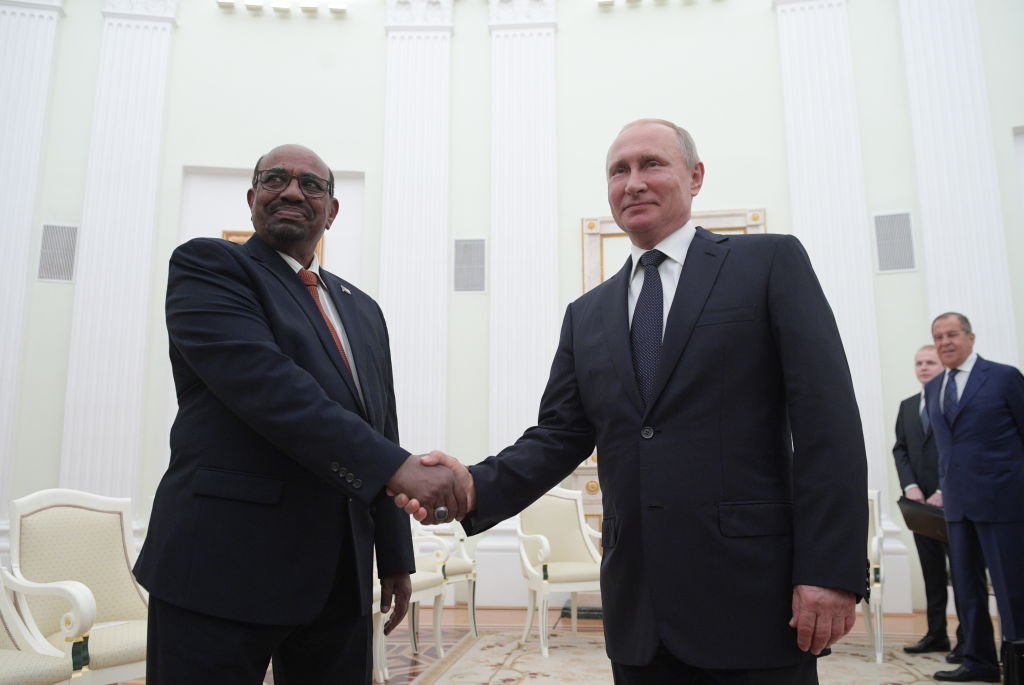
Sudan’s Omar al-Bashir may have been ousted by a popular revolution on Thursday, but his Russian allies are continuing their operations in the country, three Russian contractors in Sudan told TIME after the uprising.
The mining contractors have worked in Sudan on-and-off since last year, under a wide-ranging cooperation deal that al-Bashir struck with Russian President Vladimir Putin in Nov. 2017. The Sudanese dictator characterized the deal at the time as giving Russia the “keys to Africa” in exchange for Russian “protection from aggressive U.S. actions” in the region.
Putin accepted the arrangement, which involved supplies of Russian weapons and private military contractors to Sudan, as well as a variety of mining ventures. As TIME reported on April 4, Putin’s alliance with al-Bashir fit into a widening campaign of Russian influence across the developing world, where the Kremlin has moved to build a ragtag network of dictatorships over the past few years.
The contractors told TIME on Friday that these mining ventures are, for the most part, continuing apace despite the turmoil in Sudan. “Of course the situation is a bit more unsettled now,” says a senior engineer at a Russian mining company, Broker Expert, that has been active in Sudan since last year. “There are new people in power. But so far it looks like we are moving ahead as planned,” the engineer said, asking not to be named as he was not authorized to speak with the media.
To call the situation “unsettled” was an understatement. In a televised statement on Thursday, the Sudanese Defense Minister announced that al-Bashir had been detained by the military, declared martial law throughout the country and said a council of generals would rule Sudan during a two-year “transition period.”
Activists and opposition leaders in Sudan have pledged to carry on the revolution at least until civilian rule is established. But even under the current military leadership, Russia’s days in the country are numbered, says Khalid Omer Yousif, the acting head of the Sudanese Congress Party, which has opposed the regime in Sudan. The transitional authorities “have signaled that their strategy is based on normalization of the relationship with the Saudis and the Americans,” he says in a phone interview. “So the Russians have no chance right now. They lost their ally.”
Al-Bashir managed the relationship with Russia personally. He visited Putin twice in the past two years, despite an arrest warrant issued against him by the International Criminal Court, which indicted al-Bashir in 2009 for war crimes and genocide against his own people. Putin was glad to welcome him during both visits, the first time in his residence in Sochi and the second time in the Kremlin. But since al-Bashir’s downfall on Thursday after 30 years in power, the Russian authorities have avoided publicly taking sides in the ongoing struggle for power.
A spokeswoman for the Foreign Ministry in Moscow urged all political and military forces in Sudan to act “extremely responsibly in the aim of stabilizing the situation as soon as possible and not allowing any further escalation.” Speaking to Russian news agencies, the spokeswoman, Maria Zakharova, added that Russian citizens should avoid traveling to Sudan until further notice due to the “challenging security situation” in the country.
Despite the warning, two of the Russian engineers TIME spoke with on Friday said they are planning to return to Sudan in the coming days. “I’ve already got my tickets,” one of them said.
But there were signs that the revolution might yet interrupt Russia’s ventures in Sudan. The executives of Broker Expert, the Russian mining company, refused to answer questions when contacted by a reporter on Friday. One of their employees said his scheduled trip to Sudan as part of a team of Russian miners had been delayed amid the uprising. “We were supposed to go back in this week, just when all this was happening,” he says, also asking not to use his name for fear of losing his job. “We’re just waiting for word of what’s next.” But at this stage in the uprising, it seems the door to Africa that al-Bashir opened for Russia remains open.
More Must-Reads From TIME
- The 100 Most Influential People of 2024
- Coco Gauff Is Playing for Herself Now
- Scenes From Pro-Palestinian Encampments Across U.S. Universities
- 6 Compliments That Land Every Time
- If You're Dating Right Now , You're Brave: Column
- The AI That Could Heal a Divided Internet
- Fallout Is a Brilliant Model for the Future of Video Game Adaptations
- Want Weekly Recs on What to Watch, Read, and More? Sign Up for Worth Your Time
Contact us at letters@time.com